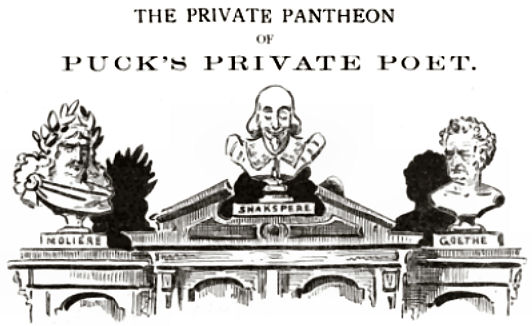Shake? William Shakespeare? Mulleary? Goethe? Henry Cuyler Bunner? Anonymous?

Question for Quote Investigator: While studying English in school I heard the following humorous rhyme about The Bard of Avon:
Shakespeare was a dramatist of note who lived by writing things to quote.
These words are from a longer poem, but I have not been able to locate it. Could you trace this phrase?
Reply from Quote Investigator: The full poem was titled “Shake, Mulleary and Go-ethe” and the subject was three famous literary figures: William Shakespeare, Molière (stage name of Jean-Baptiste Poquelin), and Johann Wolfgang von Goethe. It was published in the humor magazine Puck in 1880, and the author was listed as “V. Hugo Dusenbury”. But that name was a pseudonym for Henry Cuyler Bunner who was the long-time editor of Puck.
Below is the second stanza of the poem containing the lines about Shakespeare who was referred to as “Shake”. The author of the poem discussed busts of Shakespeare, Molière, and Goethe on top of a bookcase. The illustration that accompanied the piece is shown at the beginning of this article:1
Shake was a dramatist of note;
He lived by writing things to quote.
He long ago put on his shroud:
Some of his works are rather loud.
His bald-spot’s dusty, I suppose.
I know there’s dust upon his nose.
I’ll have to give each nose a sheath–
Shake, Mulleary and Go-ethe.
Here are additional selected citations in chronological order.
Here is the full five-stanza poem printed in Puck about the three literary greats.
I
I have a book-case, which is what
Many much better men have not.
There are no books inside, for books,
I am afraid, might spoil its looks.
But I’ve three busts, all second-hand,
Upon the top. You understand
I could not put them underneath–
Shake, Mulleary and Go-ethe.II
Shake was a dramatist of note;
He lived by writing things to quote.
He long ago put on his shroud:
Some of his works are rather loud.
His bald-spot’s dusty, I suppose.
I know there’s dust upon his nose.
I’ll have to give each nose a sheath–
Shake, Mulleary and Go-ethe.III
Mulleary’s line was quite the same;
He has more hair; but far less fame.
I would not from that fame retrench–
But he is foreign, being French.
Yet high his haughty head he heaves,
The only one done up in leaves,
They’re rather limited on wreath–
Shake, Mulleary and Go-ethe.IV
Go-ethe wrote in the German tongue:
He must have learned it very young.
His nose is quite a butt for scoff,
Although an inch of it is off.
He did quite nicely for the Dutch;
But here he doesn’t count for much.
They all are off their native heath–
Shake, Mulleary and Go-ethe.V
They sit there, on their chests, as bland
As if they were not second-hand.
I do not know of what they think,
Nor why they never frown or wink,
But why from smiling they refrain
I think I clearly can explain:
They none of them could show much teeth–
Shake, Mulleary and Go-ethe.V. Hugo Dusenbury
Professional Poet
The year after the death of Henry Cuyler Bunner in 1896 a collection of his verse was published under the title “The Poems of H. C. Bunner”. The volume included the work “Shake, Mulleary and Go-ethe”; hence, the name behind the pseudonym was made clear.2
In 1906 Carolyn Wells, the prolific children’s author and poet, published a collection called “A Whimsey Anthology” that included the poem “Shake, Mulleary and Go-ethe” which was credited to H. C. Bunner.3
In 1949 a version of the couplet was printed in a collection of humorous quotes compiled by Evan Esar. The shortened name “Shake” was replaced by the easier to understand name “Shakespeare”:4
BUNNER, Henry Cuyler, 1855-1896, American humorous writer of short stories and light verse.
Shakespeare was a dramatist of note who lived by writing things to quote.
In conclusion, this humorous couplet was written by Henry Cuyler Bunner and published in 1896. The shortened name “Shake” was used for “Shakespeare”. By 1949 a modified version was in circulation that used the complete name “Shakespeare”.
Image Notes: Illustration from the January 28, 1880 issue of “Puck” containing the quotation.
Update History: On February 23, 2025 the format of the bibliographical notes was updated.
- 1880 January 28, Puck, Volume 6, Number 151, Shake, Mulleary and Go-ethe by V. Hugo Dusenbury (Pseudonym of Henry Cuyler Bunner), Page 762, Keppler & Schwarzmann, New York. (Google Books full view) link ↩︎
- 1897, The Poems of H. C. Bunner, “Shake, Mulleary and Go-ethe”, Page was not numbered, Page 255 extrapolated, Charles Scribner’s Sons, New York. (HathiTrust) link link ↩︎
- 1906, A Whimsey Anthology, Collected by Carolyn Wells, “Shake, Mulleary and Go-ethe” by H. C. Bunner, Start Page 19, Quote Page 19, Charles Scribner’s Sons, New York. (HathiTrust) link link ↩︎
- 1949, The Dictionary of Humorous Quotations, Edited by Evan Esar, Page 42, Doubleday, Garden City, New York. (Verified on paper in 1989 reprint edition from Dorset Press, New York) ↩︎